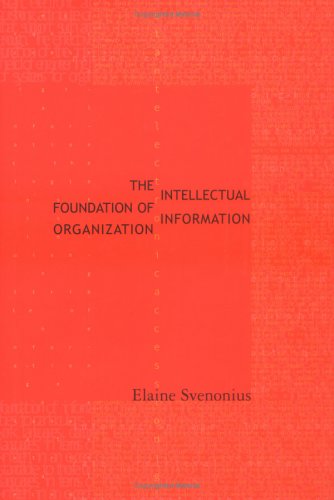 Instant electronic access to digital information is the single most distinguishing attribute of the information age. The elaborate retrieval mechanisms that support such access are a product of technology. But technology is not enough. The effectiveness of a system for accessing information is a direct function of the intelligence put into organizing it. Just as the practical field of engineering has theoretical physics as its underlying base, the design of systems for organizing information rests on an intellectual foundation. The subject of this book is the systematized body of knowledge that constitutes this foundation. Integrating the disparate disciplines of descriptive cataloging, subject cataloging, indexing, and classification, the book adopts a conceptual framework that views the process of organizing information as the use of a special language of description called a bibliographic language. The book is divided into two parts. The first part is an analytic discussion of the intellectual foundation of information organization. The second part moves from generalities to particulars, presenting an overview of three bibliographic languages: work languages, document languages, and subject languages. It looks at these languages in terms of their vocabulary, semantics, and syntax. The book is written in an exceptionally clear style, at a level that makes it understandable to those outside the discipline of library and information science.
Instant electronic access to digital information is the single most distinguishing attribute of the information age. The elaborate retrieval mechanisms that support such access are a product of technology. But technology is not enough. The effectiveness of a system for accessing information is a direct function of the intelligence put into organizing it. Just as the practical field of engineering has theoretical physics as its underlying base, the design of systems for organizing information rests on an intellectual foundation. The subject of this book is the systematized body of knowledge that constitutes this foundation. Integrating the disparate disciplines of descriptive cataloging, subject cataloging, indexing, and classification, the book adopts a conceptual framework that views the process of organizing information as the use of a special language of description called a bibliographic language. The book is divided into two parts. The first part is an analytic discussion of the intellectual foundation of information organization. The second part moves from generalities to particulars, presenting an overview of three bibliographic languages: work languages, document languages, and subject languages. It looks at these languages in terms of their vocabulary, semantics, and syntax. The book is written in an exceptionally clear style, at a level that makes it understandable to those outside the discipline of library and information science.
Customer Review: convoluted
The author certainly has a sophisticated vocabulary. However, it's unfortunate that the vocabulary often upstages the content or the attempt to convey meaningful content. The writing style could have been more clear. It's not necessary to construct convoluted sentences to appear academic. I am not against scholarly material nor do I negate its value. I felt I had to re-read many sentences and paragraphs and de-code what the author meant, sometimes unsuccessfully. I realize my opinion of this book is not in alignment with the other positive reviews. I believe the material could have been presented in a better way. I do not recommend this book if you do not have a solid background in library science.
Customer Review: The Bible of Metadata
I keep this book close to me at work and usually stick it in my laptop case when I leave for home. It is my bible for metadata. The first time I read it, I carefully underlined passages with a fine light pencil. Now I've tossed book decorum to the winds and use highligher pens! To mention just one general topic, Elaine Svenonius grapples with all of the key issues that trained librarians face when cataloguing digital materials. She also covers controlled vocabularies from several perspectives, and understands the challenges/difficulties of applying standard "book" classifications to rich media collections. That it took me a long time to get through this book has nothing to do with her style -- Elaine Svenonius writes clearly, often beautifully -- but rather with the amount of information and the mind-expanding concepts, which I still mull over as I wrestle at work with asset management.
Buy From Amazon
Sunday, January 18, 2009
The Intellectual Foundation of Information Organization (Digital Libraries and Electronic Publishing)
Subscribe to:
Post Comments (Atom)

0 comments:
Post a Comment